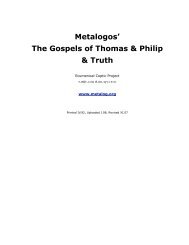Andrew Louth - Syriac Christian Church
Andrew Louth - Syriac Christian Church
Andrew Louth - Syriac Christian Church
You also want an ePaper? Increase the reach of your titles
YUMPU automatically turns print PDFs into web optimized ePapers that Google loves.
172 TEXTS<br />
D<br />
1052A<br />
B<br />
C<br />
specified in everything he performs as man. Since he has truly<br />
become man, he breathes, speaks, walks, moves his hands,<br />
uses his senses naturally in the perception of things sensible,<br />
is hungry, thirsty, eats, sleeps, is tired, weeps, is distressed,<br />
and possesses every other independent capacity and, in every<br />
other respect in the mode of a soul that with its own energy<br />
moves the body that forms one nature that has truly become<br />
and is called his own, or to speak properly, without change he<br />
has become whatever nature was needed to fulfil in reality the<br />
economy for our sake. Therefore he did not abrogate the<br />
constitutive energy of the assumed nature, nor does the<br />
teacher support such a notion when he says, ‘he assumed<br />
being in a mode beyond being, and performed human activities<br />
in a way beyond the human’, but he shows in both the newness<br />
of the modes [tropoi] preserved in the constancy of the natural<br />
logoi, without which no being is what it is. And if we say that<br />
the transcendent negation 12 entails the affirmation of the<br />
assumed nature but the destruction of this [sc. the human]<br />
constitutive energy, by what reason do we show that the same<br />
thing equally affirmed of both [natures], in respect of<br />
existence, entails destruction in respect of this [sc., the human<br />
nature]? And again if the assumed nature is not self-moved,<br />
since it is moved by the Godhead that has been truly united to<br />
it hypostatically, and we do not take away its constitutive<br />
movement, neither may we confess the same nature to be<br />
manifest as an independent hypostasis, that is by itself, but as<br />
receiving being in the very God the Word that has in truth<br />
assumed its being. 13 And since with both [natures] we have<br />
the same reason for refusal, we confess together with the<br />
nature the movement, without which there is no nature,<br />
knowing that the logos of existence is one thing, and the mode<br />
in which it exists another, convinced that one is a matter of<br />
nature, the other a matter of the economy. The coming together<br />
of these [natures] makes the great mystery of the nature<br />
[physiologia] of Jesus who is beyond nature, and shows that in<br />
this the difference and the union of the energies are preserved,<br />
the one beheld without division in the natural logos of what<br />
has been united, and the other acknowledged without<br />
confusion in the monadic mode of what has come to pass. 14 For<br />
why, where or how could nature come to be bereft of its<br />
constitutive power? For this great teacher says that ‘what<br />
completely lacks power neither is, nor is something, nor is<br />
there any kind of affirmation concerning it’. 15 It follows then<br />
that it is necessary reverently to confess the natures of Christ,




